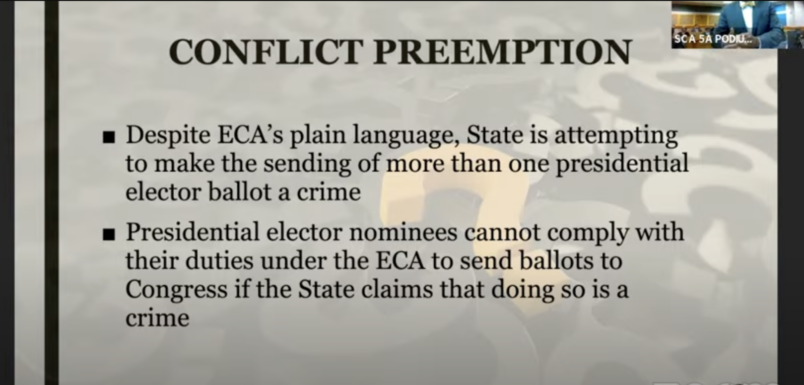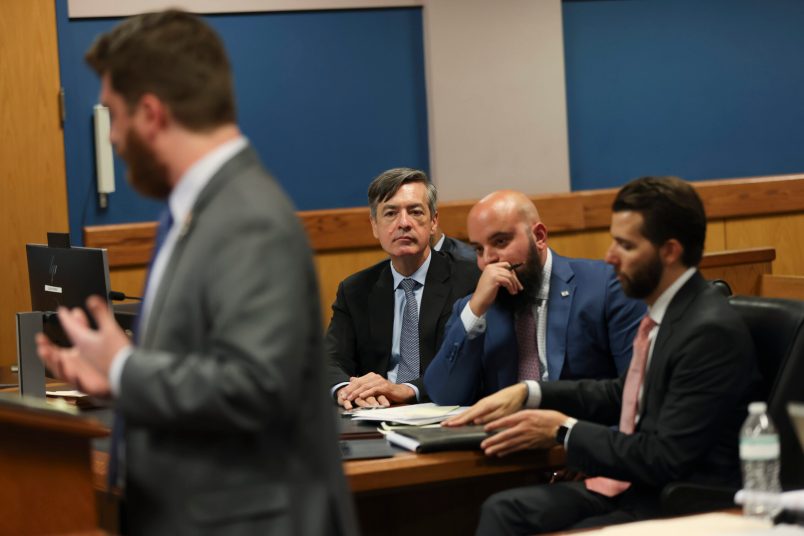Three years on, and the defense remains the same: whatever happened in 2020 was justified, and the rules then still apply now.
Former Donald Trump attorney Ken Chesebro is the latest to lob a version of this argument forward, as he seeks to have a judge toss the election conspiracy indictment against him, brought by Fulton County District Attorney Fani Willis.
Chesebro’s attorneys argued at a Tuesday hearing that Fulton County Superior Court Judge Scott McAfee should drop the case because, under Chesebro’s reading of federal election law, he could not be charged at the state level.
Per Chesebro’s reading of the Electoral Count Act, the 19th century statute amended last year, any action undertaken after the “safe harbor” deadline should be governed by federal, and not state law. Therefore, attorneys for Chesebro argued, Willis did not have the power to charge him.
Chesebro’s attorneys also rehashed arguments which Trump and his attorneys first lodged in 2020 and have reupped at various points since then: that the 1960 Hawaii dispute was relevant, that it’s fine for states to send competing slates of electors for Congress to decide, and that the 2020 election had an actual conflict in how it was conducted, which demanded resolution.
“You and I, your honor, could go to the Capitol, follow the rules as to how you’re supposed to vote, and submit our own slate of electors under Georgia state law,” Manny Arora, an attorney for Chesebro, said at one point during Tuesday’s hearing.
Arora said separately that Georgia prosecutors were “usurping Congress’ authority” to decide who the legitimate electors were.
Arora illustrated his argument with a powerpoint presentation which outlined his points: arguing that if the judge agreed that creating fake — “alternate” — elector slates was a crime, then that would violate the so-called purpose of federal election law. In Chesebro’s view, which was adopted by the Trump campaign during its coup attempt, that allows for dueling elector slates to appear and be decided on by Congress.

“I’m sorry that we haven’t had [Electoral Count Act] challenges in the 140 years it has gone on,” Arora remarked Tuesday.
At another point, Arora pointed to amendments passed into law last year as proof that Chesebro’s interpretation, at the time of the actions alleged in the indictment, was correct. The changes made in the passage of the Electoral Count Reform and Presidential Transition Improvement Act of 2022 clarified that Pence did not have the authority to toss electoral vote slates. Chesebro’s attorneys did what some worried would happen when the changes were passed, and used the amendments to suggest that the law itself was vague.
The fake electors were the keystone in Trump’s effort to reverse his loss in the 2020 election. Assembled in seven states which Biden won, the fake electors were meant to replace the legitimate Biden electors by their state legislatures, the courts, or members of Congress: whoever Trump and his acolytes managed to pressure.
Chesebro, along with John Eastman, masterminded the legal theory behind the electors, while Chesebro himself allegedly coordinated the creation of the fake elector slates. Chesebro told TPM last year in an exclusive interview that his actions were “what lawyers do.”
Throughout the hearing, Judge McAfee seemed disinclined to go along with the request, saying that it was too early in the process to decide on the matter.



